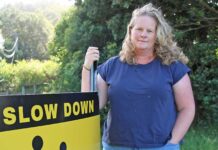There are not many conversations among those bringing up children on the island, or those on a pension or fixed income, that doesn’t almost immediately descend into the skyrocketing costs of trying to keep you and your family fed, housed and warm this winter. It’s a nationwide problem, but the island brings with it extra costs and extra pressures meaning many young families are wondering just how long they can ‘hold on’.
You’ll probably want to take an aspirin before you open your rates bill if you are lucky enough to own your own home – even if your house itself has lost a good chunk of its rateable value.
In more uplifting news, for farmers at least but perhaps not anyone else, last week Stats NZ reported that food prices lifted five percent in the year to July. Milk was up 16 percent annually, cheese 29.5 percent and of course butter, a whooping 42.2 percent.
But insurance has had the largest price rise of any item tracked in the consumer price index since 2000, Consumer NZ says, having released a report late last week into the insurance industry, investigating how climate change is affecting the cost and availability of house and contents insurance. The cost of insurance had gone up an eye-watering 916 percent since 2000.
Price increases are prompting people to drop their insurance, Consumer NZ investigative team leader Rebecca Styles says and it was particularly an issue for those on fixed incomes. “They’ve come to me and they’re like ‘I can’t keep paying these, 15 percent, 20 percent, 30 percent increases year-on-year. We can’t afford it anymore.” She said, in 2022, seven percent of those who had dropped their house insurance had done so because of the cost. This year, the proportion was 17 percent. That’s a huge chunk of the population taking a big risk with no safety net.
In another investigation released in the last week (yes, the news just keeps getting better) Consumer NZ found 20 percent of people have also had difficulty paying their power bill in the past year – up from 18 percent last year. Stats NZ confirmed electricity prices jumped 4.9 percent in the June quarter, the steepest rise in over a decade, with prices increasing 10.4 percent in the year ending June.
Greenpeace promptly labelled the big four power companies ‘vampires’, for an expected record payout of $1.4 billion to their shareholders. Fair call! Mercury, Contact and Genesis have already announced an increase to their shareholder payouts in their annual results. The final gentailer, Meridian, declared a final ordinary dividend of 14.85 cents per share late last week.
“Families and businesses are being slammed by record high power bills, all so that the big four power companies can siphon off an expected $1.4 billion for their shareholders,” says Greenpeace Aotearoa campaigner Gen Toop
“This is corporate blood-sucking at its most brutal”.
In a soft labour market with relatively stagnant wages, the price of everything just going up and up is unsustainable. And with 97 percent of New Zealand’s businesses being small to medium sized ‘enterprises’, all the will in the world to pay better wages relies on an economy that supports them. And there are not many positive news stories in that sector either. These small businesses generate 28 percent of New Zealand’s GDP, employ over 600,000 Kiwis, comprise 97 percent of all businesses nationwide and are the backbone of this country’s (and this island’s) economy.
To quote Stuff’s Verity Johnson, these are the same businesses that have, over the past five years, been simultaneously “punched in the face, knocked out, stomped on and talked down to by a government whose best advice has been, ‘yeah, it’ll get better’.” Data released by Centrix shows there have been 297 hospitality businesses liquidated in the past 12 months, compared to 199 in the prior year. A further 2564 hospitality businesses have shut, 19 percent more than the 2158 a year earlier. And last year wasn’t great – remember ‘survive ‘til ’25’?
Our Minister for Economic Growth (and simultaneously our Finance Minister) Nicola Willis, who, along with her party, presents herself as the saving grace of our economy, last week issued a proclamation telling us we were all being too “doomsday” about the economy. With an instruction to ignore the ‘merchants of misery’. Does she mean poor people? Middle New Zealand? Retirees? Anyone running a small business? Anyone who didn’t vote for her?
Coming from someone ‘wealthy and sorted’, I suggest she read the room a little better. This from a government run by people who own several houses, mortgage-free, and earn several hundred thousand a year? Really?
If you are someone who is able to access what you want individually and privately, these issues certainly don’t excite the fight or flight response every time another power bill is due.
Her press conference, following the Reserve Bank’s decision to cut the OCR to 3 percent last week was littered with words and phrases like “confidence”, “transition”, “looking to the future”, “economic activity”, “conditions for growth”, and “acceleration”.
“I want New Zealand households to look ahead and see that things are going to get better according to the economists whose job it is to analyse these things,” Willis said.
She admitted many Kiwi households are still arriving at the supermarket checkout and finding the total figure that comes up on screen “really really scary”.
Yes Nicola, it is. But telling us to start spending, when there is simply nothing to spend, just smacks of a tone-deaf out-of-touchness that only further makes those really struggling feel more alone, ashamed and isolated. Not to mention, cold, hungry and frightened.
• Merrie Hewetson






